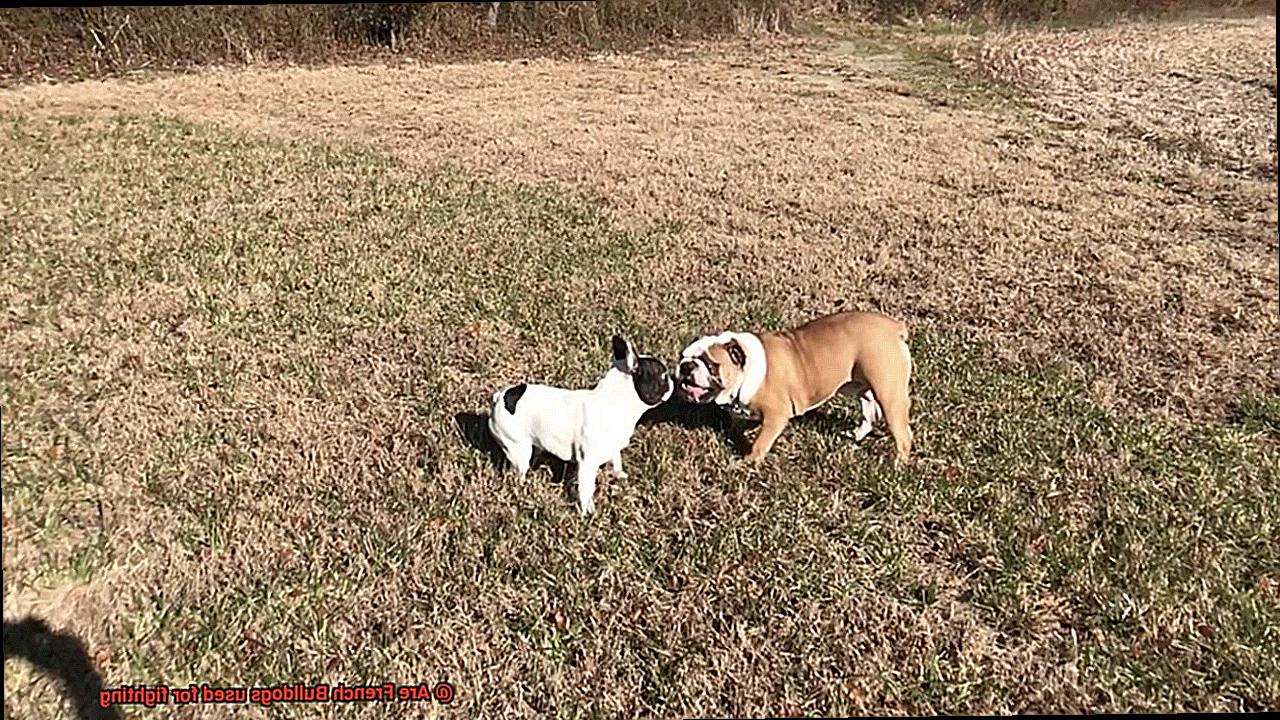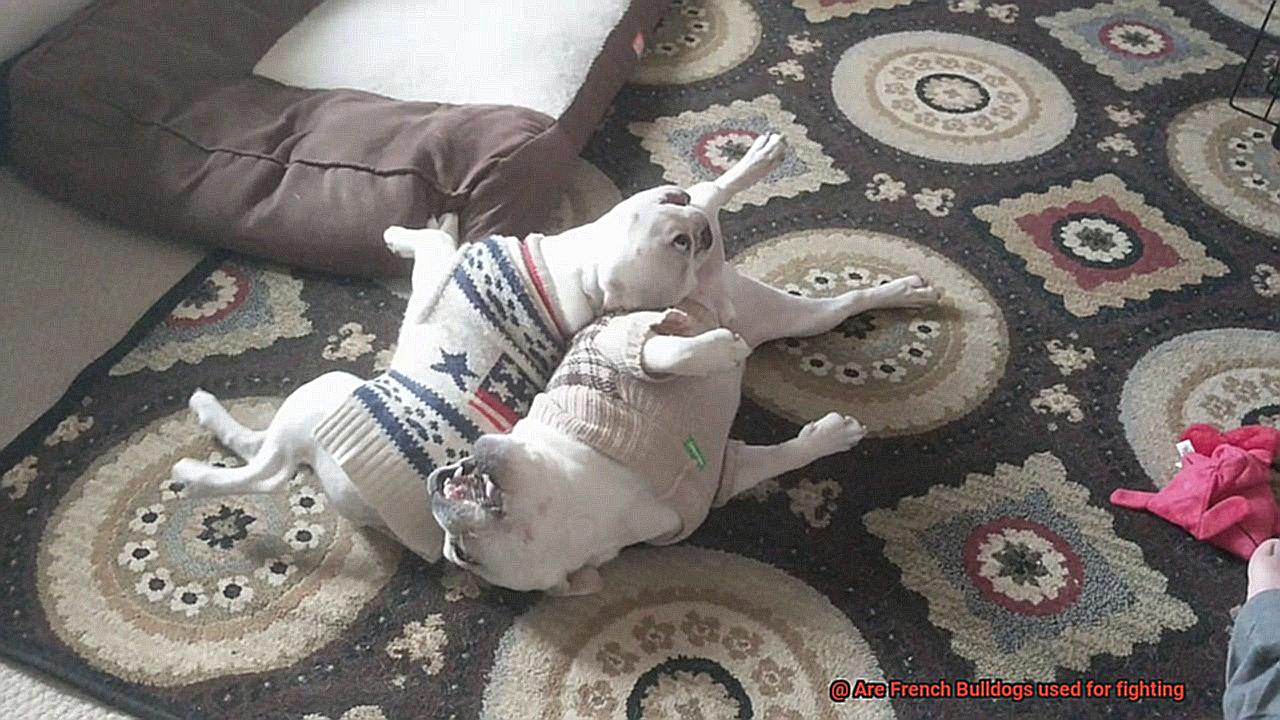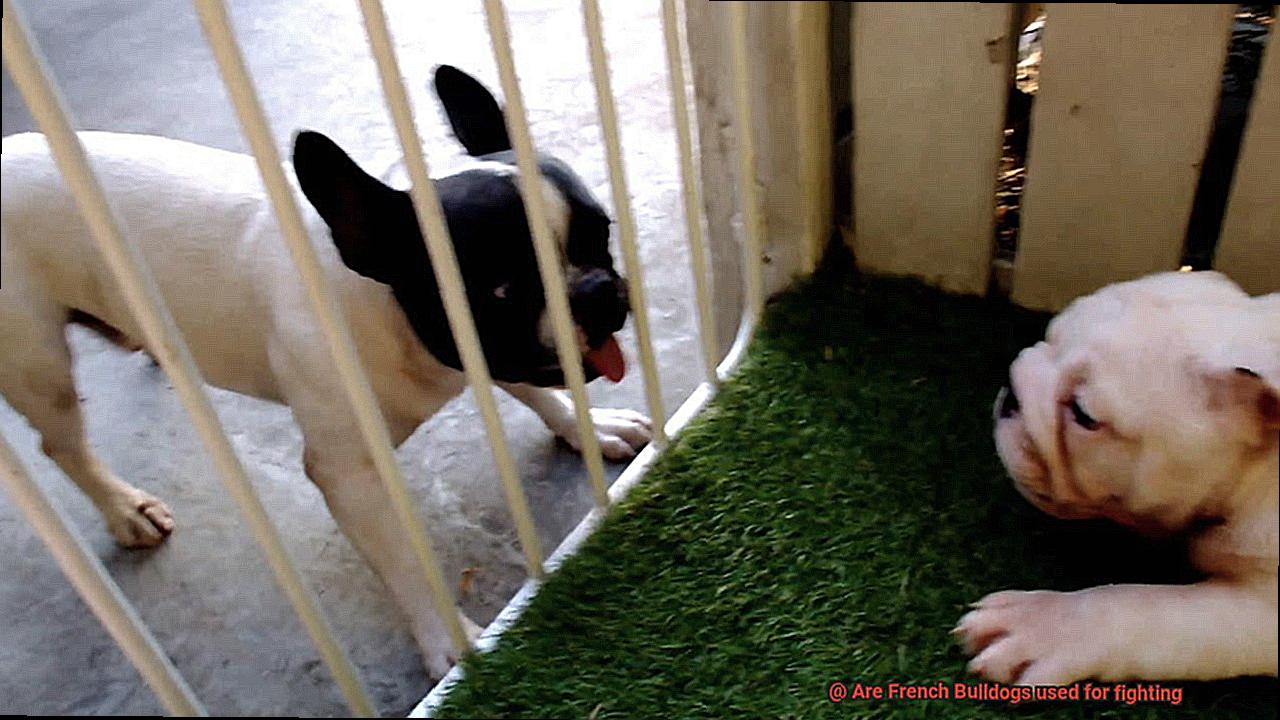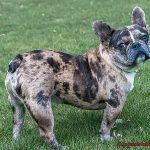Are French Bulldogs used for fighting?
In the enchanting realm of dogs, where breeds embrace various roles as protectors, working companions, or loyal family pets, it’s hard to fathom our beloved French Bulldogs being embroiled in something as sinister as fighting. But let’s face it, the dark underbelly of human history is filled with tales of dogs exploited for blood sport.
Today, we dive headfirst into the controversial topic that has sparked countless debates: Are French Bulldogs used for fighting? As an expert in canine behavior and history, I’m here to shed light on the ambiguous connections between this adorable breed and the brutal world of dog fighting.
With their casually poised demeanor and undeniable charm, French Bulldogs have won hearts worldwide for their affectionate nature and playful spirit. Their compact size and endearing bat-like ears have made them cherished companions in households across the globe. Yet rumors and misconceptions persist about their potential involvement in dog fighting.
Join me on this captivating journey as we separate fact from fiction, dispel myths, and confront the grim reality that dogs of all breeds have faced throughout history. Together, we’ll unravel the truth behind French Bulldogs and their connection (if any) to the cruel and illicit world of fighting. Let’s dig deeper into this controversial subject—exploring historical accounts, modern-day practices, and the breed’s innate characteristics—to uncover the real story behind these beloved canines.
History of the French Bulldog Breed
Contents
- 1 History of the French Bulldog Breed
- 2 Physical Characteristics of French Bulldogs
- 3 The Temperament and Nature of French Bulldogs
- 4 Why French Bulldogs Are Not Suitable for Fighting
- 5 The Dangers of Training a Dog for Fighting
- 6 Responsible Breeding Practices to Ensure Non-Aggressive Behavior
- 7 Reporting Cases of Animal Abuse or Neglect
- 8 Conclusion
From its origins in England to becoming a cherished companion worldwide, this breed has undergone remarkable transformations. Join us as we delve into the past and unravel the story behind these adorable bat-eared pups.
The English Origins:
Originally bred in England in the 1800s, French Bulldogs were initially used for ratting and fighting sports. Their strong and muscular build made them ideal for these activities. However, as times changed, so did their purpose.
Arrival in France:
During the Industrial Revolution, lace workers from Nottingham migrated to France, bringing along their beloved Bulldogs. The French society quickly fell in love with these adorable canines, and they became highly fashionable among the upper class.

Adaptation and Evolution:
To suit the preferences of their new owners, French Bulldogs were crossed with local breeds such as terriers and pugs, resulting in a smaller size and distinctive features like bat-like ears and a flat face. These unique characteristics became synonymous with the breed.
International Recognition:
By the late 19th century, the French Bulldog had gained recognition from the French Kennel Club in 1885 and soon achieved international acclaim. The breed’s popularity spread across Europe and eventually reached other parts of the world, including the United States.
Transition to Companion Animals:
Over time, French Bulldogs transitioned from being working dogs to becoming beloved companion animals. Their friendly and sociable nature made them perfect for families and individuals seeking loyal and affectionate pets. They also adapted well to apartment living, further contributing to their popularity.
Conclusion:
The history of the French Bulldog breed is intertwined with rich tales of adaptation, evolution, and companionship. While they may have had a humble beginning as fighting dogs, the French Bulldog’s modern-day role is that of a gentle and loving companion. It is essential to understand their roots while appreciating their present-day temperament and the joy they bring to countless families worldwide.
Physical Characteristics of French Bulldogs
French Bulldogs are a small breed of dog with a unique and charming appearance. In this section, we will explore their physical characteristics in detail.
Build and Body Structure:
French Bulldogs have a compact and muscular body with a sturdy build. They have a broad chest and a low center of gravity, which gives them stability despite their small size. Their hindquarters are slightly rounded and allow them to move with agility.
Head:
One of the most distinguishing features of French Bulldogs is their head. It is large in proportion to their body, with a flat and wide skull. They have a short muzzle that gives them their characteristic “smushed” face. Their nose is wide and black, while their lips are thick and slightly pendulous, giving them an adorable “smiling” expression.

Ears:
The bat-like ears of French Bulldogs are erect and set high on the head. This unique feature adds to their charm and sets them apart from other breeds.
Coat and Colors:
French Bulldogs have a short and smooth coat that comes in a variety of colors. These colors include brindle, fawn, and pied. Some French Bulldogs may also have a combination of these colors.
Tail:
The tail of French Bulldogs is naturally short and usually straight or screwed. It is important to note that their tails are not docked or shortened.

Eyes:
French Bulldogs have large, round eyes that are dark in color. These expressive eyes add to their friendly and lovable appearance.
Overall, French Bulldogs have a distinct physical appearance that makes them instantly recognizable. Their compact size, muscular build, bat-like ears, smushed face, and variety of coat colors all contribute to their unique charm.

Whether you are already a proud owner or considering adding a French Bulldog to your family, their physical characteristics are sure to captivate your heart.
The Temperament and Nature of French Bulldogs
Are you the proud owner of a French Bulldog? Or perhaps you’re considering getting one? Well, you’re in for a treat. French Bulldogs are one of the most affectionate and friendly dog breeds out there. They have a temperament that is perfect for families and individuals alike. So, let’s dive into the fascinating world of French Bulldog temperament and discover what makes them so special.
Adaptable and Easygoing
French Bulldogs are known for their laid-back and easygoing nature. They are highly adaptable and can fit into different types of households with ease. Whether you live in a small apartment or a spacious house, a French Bulldog will make themselves right at home. They don’t require a lot of exercise, making them an excellent choice for people with busy lifestyles or limited mobility.
Playful and Affectionate
French Bulldogs are playful little bundles of joy. They love to chase after toys, play fetch, or simply romp around in the backyard. Their affectionate nature shines through in everything they do. They will shower you with kisses, snuggle up on your lap, and follow you around the house like a shadow. If you’re looking for a loyal and loving companion, a French Bulldog is the perfect match.

Great with Children and Other Pets
If you have children or other pets in your household, you’ll be delighted to know that French Bulldogs get along famously with both. They have a patient and gentle demeanor, which makes them excellent playmates for kids. French Bulldogs also tend to be friendly towards other animals, making them the ideal addition to any multi-pet household.
Attention Seekers
French Bulldogs thrive on human attention. They love to be in the center of all family activities and enjoy being part of the action. Whether it’s going for a walk, watching TV, or having a game night, your French Bulldog will want to be right there with you. They are incredibly loyal and devoted to their owners, forming strong bonds that last a lifetime.
Courageous Protectors
Despite their small size, French Bulldogs have a courageous and confident nature. They may not be aggressive like some other dog breeds, but they will go to great lengths to protect their families if they sense any danger. Their protective instincts make them excellent watchdogs, always on alert for any potential threats or suspicious activity.
Intelligent and Trainable
French Bulldogs are intelligent dogs, although they can be a bit stubborn at times. With consistent training methods and positive reinforcement techniques, they can learn commands and tricks effectively. French Bulldogs are eager to please their owners, which makes training sessions enjoyable for both the dog and the owner.
It’s important to remember that individual temperaments can vary among French Bulldogs. While most of them possess these general temperament traits, there may be some exceptions. Factors such as genetics, socialization, and upbringing can influence a French Bulldog’s temperament.
Why French Bulldogs Are Not Suitable for Fighting
French Bulldogs are beloved for their adorable appearance, friendly nature, and sociable demeanor. However, these qualities also make them unsuitable for the cruel and illegal practice of dog fighting. In this article, we will explore the reasons why French Bulldogs are not suitable for fighting, considering their physical characteristics, temperament, breeding practices, and legal implications.
Physical Limitations:
French Bulldogs have a compact and muscular build, but they are not designed for intense physical activity or combat. Their short snouts and brachycephalic faces restrict their ability to breathe properly, especially during exertion. This can lead to respiratory distress and overheating, putting them at a significant disadvantage in a fighting situation.
Temperament:
French Bulldogs are known for their friendly and sociable temperament. They thrive on human companionship and possess a strong desire to please their owners. Their loyalty and affectionate nature make them much more suited for family life and being a companion pet rather than engaging in aggressive behavior required in dog fighting.
Lack of Predatory Instincts:
French Bulldogs do not possess the same predatory instincts or drive that some other breeds may exhibit. They are not naturally inclined to engage in aggressive behavior towards other animals, making them less likely to participate in fights willingly. Their friendly and amiable demeanor makes them more prone to seeking social interaction rather than confrontation.
Responsible Breeding Practices:
French Bulldog breeders prioritize the health, well-being, and overall temperament of these dogs. They focus on producing puppies with desirable traits such as good health, stability, and friendliness. The breeding standards for French Bulldogs do not promote aggression or any characteristics that would make them suitable for fighting.
Legal Considerations:
It is important to note that dog fighting is illegal and widely condemned in many countries, including the United States. Engaging in dog fighting can result in severe legal consequences and animal cruelty charges. The majority of French Bulldog owners are law-abiding citizens who prioritize the welfare of their pets and would never consider using them for such purposes.
The Dangers of Training a Dog for Fighting
French Bulldogs, known for their small stature and lovable temperament, are unfortunately not immune to being targeted for dogfighting rings. This cruel and inhumane practice poses significant dangers not only to the dogs involved but also to the people around them. As an expert on this topic, I want to shed light on the dangers of training a French Bulldog for fighting, so that owners can better understand the risks and take necessary precautions to keep their beloved pets safe.
Physical and Psychological Abuse:
Owners who train their French Bulldogs for fighting subject them to physical and psychological abuse. This includes forceful conditioning techniques such as beating or starving the dog to make them more aggressive and willing to fight. These abusive practices not only cause immense suffering but can also lead to long-lasting negative effects on the dog’s well-being.
Lifelong Injuries:
Dogs trained for fighting are at a higher risk of sustaining severe injuries during fights. These injuries can include broken bones, puncture wounds, and internal damage, which can lead to lifelong disabilities or even death. French Bulldogs, with their delicate bone structure and brachycephalic (short-nosed) features, are particularly vulnerable to these injuries.
Aggression towards Humans and Animals:
Dogs trained for fighting often exhibit aggressive behavior not only towards other dogs but also towards humans and other animals. This poses a serious safety threat to their owners, as well as the community at large. It is essential for owners to be aware of this heightened aggression and take appropriate measures to prevent any harmful incidents.
Legal Consequences:
Engaging in dogfighting or training dogs for fighting is not only morally wrong but also illegal in many jurisdictions. Owners who are caught participating in or promoting dogfighting can face severe legal consequences, including hefty fines and potential imprisonment.
As responsible French Bulldog owners, it is our duty to protect our furry friends from such dangers. Here are some proactive measures you can take to prevent your French Bulldog from falling victim to dogfighting:
- Keep your dog securely confined: Ensure that your French Bulldog cannot escape your property and be targeted by dogfighting rings.
- Provide proper socialization and training: By exposing your dog to positive experiences and training methods, you can help build their confidence and discourage aggressive behavior.
- Report suspicious activities: If you suspect any dogfighting activities in your area, it is crucial to report them to the authorities. Your actions could save innocent lives.
Responsible Breeding Practices to Ensure Non-Aggressive Behavior
French Bulldogs, known for their friendly and affectionate nature, are a popular choice for many dog lovers. To maintain their non-aggressive behavior, responsible breeding practices are crucial. Breeders should prioritize the temperament and behavior of their dogs when selecting breeding pairs, as these traits are likely to be passed down to their offspring. Avoiding breeding dogs with a history of aggression or any other behavioral issues is also important.
Regular health and temperament screenings should be conducted before breeding French Bulldogs to ensure that only dogs with good physical and mental health are used for breeding. This helps in preventing any genetic predispositions towards aggression from being passed down to future generations.
Early socialization is key in preventing aggressive behavior in French Bulldogs. Puppies should be exposed to various people, animals, and environments from an early age to help them develop good social skills and reduce the likelihood of aggression later in life. Breeders should provide a nurturing and stimulating environment during the puppies’ early development stages. This includes proper nutrition, adequate exercise, mental stimulation, and positive reinforcement training.
Educating new owners about the importance of continued socialization and training throughout the dog’s life is also crucial. Responsible breeders should have a strict screening process for potential owners to ensure that their puppies are placed in appropriate and responsible homes. This includes assessing the owner’s knowledge of the breed, their ability to provide a suitable environment, and their commitment to ongoing training and socialization.
Responsible breeders should always be available for support and guidance throughout the dog’s life, offering advice on training, behavior management, and any other concerns that may arise. By following these responsible breeding practices, breeders can significantly reduce the likelihood of French Bulldogs being used for fighting purposes and promote non-aggressive behavior in the breed.
Reporting Cases of Animal Abuse or Neglect
Unfortunately, cases of animal abuse and neglect can still occur, posing a threat to their well-being. In this blog post, we will delve into the importance of reporting such cases and provide guidance on how to do so effectively.
Why Reporting Matters:
Reporting cases of animal abuse or neglect is crucial for several reasons:
- Saving Lives: By reporting these cases, you become a lifeline for mistreated animals, including French Bulldogs. Your timely action can help rescue them from further harm.
- Holding Perpetrators Accountable: Reporting enables authorities to investigate and take appropriate legal action against those responsible for animal cruelty. This ensures that justice is served and acts as a deterrent for potential abusers.
- Preventing Recurrence: Reporting not only stops the current abuse but also helps prevent future incidents. When abusers face consequences, it raises awareness about the seriousness of animal cruelty, leading to a safer environment for all animals.
How to Report Effectively:
Follow these steps to report cases of animal abuse or neglect effectively:
- Gather Information: Document the situation with photographs or videos. Note any identifiable individuals involved and provide a detailed description of the incident or ongoing mistreatment.
- Contact Authorities: Reach out to your local animal control agency or non-emergency police line to report the case. They are trained to handle such situations and will guide you through the necessary steps.
- Anonymity Is Key: Whenever possible, report anonymously to protect yourself and the animals involved. However, if you feel comfortable doing so, providing your contact information can assist authorities in gathering further evidence or following up on the case.
- Respect the Legal Process: Let the professionals handle the investigation and take appropriate action based on their findings. Avoid taking matters into your own hands, as it can compromise the legal process.
Raising Awareness:
To prevent future instances of animal abuse or neglect, it is essential to raise awareness. Share information through social media platforms, community organizations, or local events to educate others about recognizing and reporting animal cruelty.
4d4nq5qMD_k” >
Conclusion
In conclusion, French Bulldogs are unequivocally not used for fighting. While they may have had a historical connection to the gritty world of ratting and combat sports in their early origins, this breed has since undergone a remarkable transformation into adored companion animals. Their physical attributes, such as their dainty size and unmistakable brachycephalic faces, render them unsuitable for grueling physical endeavors or any form of battle. Moreover, their affable and sociable nature predisposes them to seek human companionship rather than partake in aggressive behavior.
The significance of responsible breeding practices cannot be overstated when it comes to fostering non-aggressive behavior in French Bulldogs. Breeders must prioritize the selection of breeding pairs with impeccable temperaments while scrupulously avoiding dogs with any history of aggression or behavioral issues. Early socialization and ongoing training serve as indispensable tools in preventing the emergence of aggressive tendencies.
It is our moral obligation to report any instances of animal abuse or neglect that come to our attention. By taking action against these abhorrent acts, we can save the lives of mistreated animals and ensure that those responsible face the consequences for their actions. Remember to gather all pertinent information, promptly contact the appropriate authorities, and respect the legal process when reporting such cases.
Raising awareness about recognizing and reporting animal cruelty plays an instrumental role in preventing future instances of abuse or neglect. Utilize various platforms to disseminate information and educate others about the paramount importance of safeguarding our furry companions.




